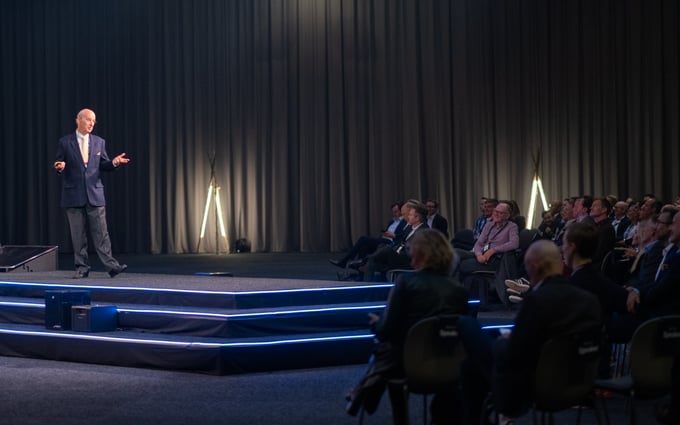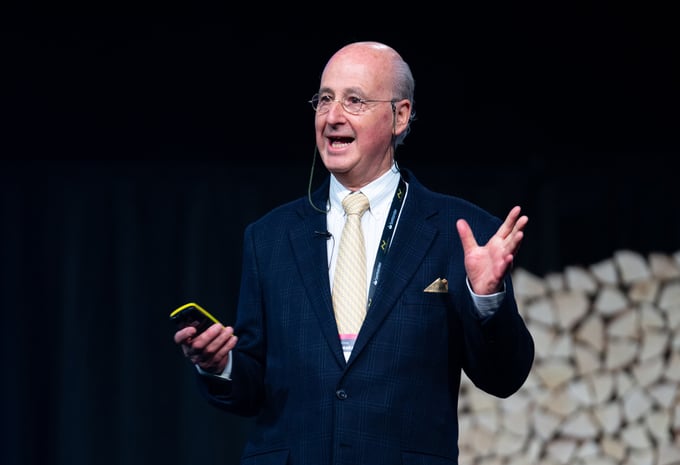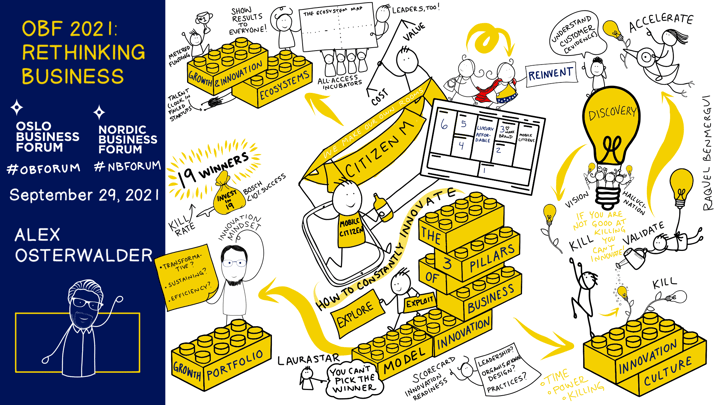Stéphane Garelli is considered one of the top lecturers on economic and business matters. He spent 13 years as Managing Director of the World Economic Forum and is a professor at both the International Institute for Management Development (IMD) and the University of Lausanne. He has pioneered research and theory on competitiveness, and he is the Founder of the World Competitiveness Center. At the Oslo Business Forum, Stéphane helped leaders understand the post-pandemic chapter in globalization, discussing what it means for nations, companies, and people and their competitiveness.
The Post-Pandemic Landscape
Many of us have chalked 2020 up as a terrible year, marked by a global pandemic, an unprecedented increase in natural disasters, and an alarming rise in social unrest. The global economy felt the impact, as 167 countries plunged into recession and economic uncertainty surged.
“We need ideas, not numbers.”
Stephane Garelli at Oslo Business Forum 2021: Rethinking Business
Primed with this understanding of the types of innovation they might invest in, leaders in the room were ready to evaluate their growth portfolios, assess their growth and innovation initiatives, and understand their innovation cultures.
As we emerge from the pandemic, economists’ forecast for the future looks improved. Economic recovery is on the horizon and the numbers look good. But to ensure recovery and sustain competitiveness, Stéphane Garelli said, “We need ideas, not numbers.”
Stéphane gave leaders a look at where we’re coming from and where we’re headed, drawing comparisons between past recessions and the current economic landscape. What economists predict today is not unlike past patterns: an exuberant economy in the summer, followed by corrections in the fall, and then growth leading to longer-term recovery.
Stéphane noted that one of the greatest factors driving the recovery of the global economy is the U.S. and its stimulus-in-the-making. With $6 trillion already spent and a $1 trillion infrastructure plan in progress, everyone will benefit. Despite the optimistic signs, however, Stéphane cautioned leaders to be prepared for continued uncertainty—because unlike a war with a conclusive end, there is no way to predict when the pandemic will stop.

Coping with the Unknown
The continued uncertainty surrounding the pandemic has left leaders with many questions about what comes next and how to prepare for the impact. One thing economists feel certain about is that inflation is on the radar—but the severity of it depends on several factors.
Stéphane believes the biggest question surrounds private consumption. Many people are emerging from the pandemic with excess savings, having had limited opportunities to spend over the past 18 months while businesses were closed. Economists are waiting to see whether people will spend or save.
Other issues posing potential problems for the future include the global supply chain, which has been impacted by shipping delays and rising freight rates. Debt and the various options to repay it create another question. And, finally, there is uncertainty around whether interest rates will rise or fall.
What is the New New Normal?
As we grapple with the unknown and begin to make sense of the future, economists are focused on globalization and the new new normal. Stéphane summed up the past chapter of globalization and described the new chapter.
- The Past Chapter: Just in Time
Globalization was previously defined as one global world driven by cost efficiency, speed, and high profits. It was vulnerable, however, to disruption. - The New Chapter: Just in Case
The future of globalization is viewed as a decoupled world, with less economy of scale, more duplication of technology, and more resilience. However, its downfall may be more cost and less profit.
Stéphane noted that globalization has shifted from an economic debate to a political debate, pointing to tariffs as one example. Increased tariffs combined with restricted market access have posed a problem with a potentially troubling solution. Many political leaders are making a case to shift away from outsourcing and towards insourcing or bringing things back ashore.
Moves like this may lead to decoupling the world economies and duplicating technologies, something economists already see in China. Stéphane highlighted China’s increased spending on technology, citing the trend as an indicator that “Everyone is playing a parallel game, trying to be more independent.”
Past experience points to another possible solution to economic crises: government intervention. Stéphane called this “the empire strikes back.” He noted that the power of state often comes with governments seeking to veto certain transactions, place restrictions on dividends and buy-backs, and increase regulation and taxation—all of which have consequences for competitiveness.

The Future of Competitiveness
Stéphane believes the key question for nations, companies, and people seeking to sustain their competitiveness is whether to pursue free enterprise or free partnership. Free enterprise compels us to “go it alone,” while free partnership begs the question of with whom we want to work.
As they grapple with this question, many companies are pursuing new strategies and branching out of the technology highway: Amazon is shifting to retail food; Alphabet is transitioning to advertising; Tesla is turning to batteries; and Apple is moving to make watches.
As these shifts occur, Stéphane believes one of the greatest worries is whether we’re creating a black hole economy. With a lot of innovation, a lot of technology, and a lot of money, a few large companies are gobbling up many small companies. In such an environment, Stéphane asked, “Can small companies grow big?”
A parallel problem is overcapitalization, which occurs when everyone invests again and again in the same companies. When this occurs, companies in sectors like technology, banks, and pharma begin to see outsized and unrealistic valuations—which attract only high-risk investors. And this begs the question: should the largest companies be dismantled, splitting the platform from the services?
The New Mindset for Business
While the pandemic has presented many problems that impact competitiveness in the future, it has also provided invaluable insights. In many ways, we’ve gained greater clarity about what people want from businesses. Stéphane noted four primary needs that have emerged:
- Security, such as certification of quality or sanitation.
- Transparency, including tracking to understand where products are coming from.
- Ethics, solidified through codes of conduct or contracts.
- Sustainability, to fight concerns such as climate change.
These consumer desires are creating a new mindset for business, born of the understanding that the structure of society has changed. Stéphane illustrated the weight of this insight by quoting influential management thinker Peter Drucker, who once said, “Changes in society can have a deeper impact on companies than changes in management.”
Societal shifts have companies adopting a new mindset and leaning into ideas that may revive their competitiveness, such as:
- Individualism and self-fulfillment, as they strive for differentiation.
- Improving the world, as they adopt global perspectives and ideologies.
- Profit and purpose, as they recognize leadership requires them to enter the world of others.
As these mindsets emerge and businesses change, Stéphane said, “The hybrid company is the company of the future.” He described a hybrid company as one that is both:
- Online and face-to-face
- Local and global
- Multi-brand and multi-channel
- With people working onsite and offsite

The Takeaways for Leaders Today
Stéphane left leaders with two key things to keep in mind.
First, he cautioned against groupthink. As the saying goes, “When everyone thinks the same, perhaps no one is thinking anymore.” Stéphane encouraged leaders and their organizations to carefully consider their strategies, as originality and differentiation will be critical to sustaining their competitiveness.
Second, he reminded leaders that timing is everything. It is not a matter of if a strategy is right, but when a strategy is right. The concepts behind some of today’s strongest companies, such as Southwest Airlines and Apple, once failed only to emerge successfully under different circumstances. When it comes to your competitiveness, Stéphane said, “It is very wrong to be right before everyone else.”
Key Points
- Economic recovery is on the horizon, but to ensure recovery and sustain competitiveness, we need ideas, not numbers.
- Globalization was once defined as one global world, driven by cost efficiency, speed, and high profits. The future of globalization may be a decoupled world, with less economy of scale, more duplication of technology, and more resilience.
- A key question for nations, companies, and people seeking to sustain their competitiveness is whether to pursue free enterprise or free partnership.
- The pandemic has created societal change and shifted consumer behaviors—and understanding these changes is driving a new business mindset and new, hybrid business models.
- Be cautious of thinking and acting the same as everyone else—originality and differentiation will be critical to sustaining competitiveness.
- Timing is everything and it is often not a matter of if a strategy is right, but rather when a strategy is right.
Questions to Consider
- How do you view the post-pandemic landscape? Which economic factors are creating the most uncertainty in your business?
- Given the future of globalization, how is your organization thinking about free enterprise or free partnership?
- How has the pandemic and its related impacts changed your view of your competitors? Of your ability to be competitive?
- What insights have you gained from emerging consumer habits that are informing your future strategy?
- Has your business made a shift towards a hybrid approach? What advantages and disadvantages come with that approach?
Early bird tickets now available to Oslo Business Forum 2022: Future-Focused Leadership. Sign up now to secure your spot!